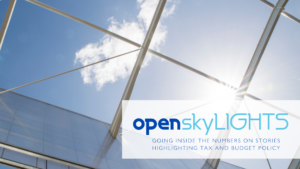22%
New analysis by The Tax Foundation largely mirrors analysis by OpenSky that the ballot initiative to eliminate income, property and inheritance taxes in Nebraska would require a statewide consumption tax rate of 22%. OpenSky’s analysis was released last year.
Even at 7.5%, the rate suggested by proponents, the consumption tax would make everyday purchases more expensive for Nebraska families. At 22%, the rate that The Tax Foundation and OpenSky estimate is required to match existing revenues to fund state and local government services, those everyday items and necessities would be even more expensive. The higher rate would also encourage so-called border bleed, where residents cross a border to shop for items at a lower rate.
The significant change in state tax policy proposed in the ballot initiative would also remove aspects of local control by shifting budget decisions for local government subdivisions to Lincoln.
Later this month, OpenSky will be meeting with community groups in North Platte and Henderson to discuss the consumption tax proposal.
Read more from the Lincoln Journal Star
Read OpenSky’s analysis of EPIC Option proposal
$70 million
The $240 million in new cash fund transfers proposed by the Appropriations Committee includes sweeping $70 million from the State Unemployment Insurance Trust Fund to the general fund. The unemployment fund uses fees collected from employers to ensure unemployment benefits are consistently available. Unemployment insurance plays a crucial role in promoting long-term budget sustainability by stabilizing the state economy during times of economic downturns.
Sweeping cash funds collected for a specific purpose to bolster the state’s general fund has been a prominent subject of debate during discussion of the budget package this week. Watch for updates from OpenSky once budget debate resumes.
Subscribe to OpenSky video updates
Read more for Nebraska Examiner
Number crunching
- $266.9 million: Sales of legal marijuana in Michigan generated $266.2 million in state tax revenue last year, surpassing $192.6 million collected from alcohol sales. Illinois, Colorado, Arizona and Washington have all seen marijuana tax revenue surpass annual alcohol revenue.
- 11,000: Annual eviction filings in Nebraska increased from 6,200 in 2019 to 11,000 last year, according to the Women’s Fund of Omaha. Affordable housing remains an issue in Nebraska, with low inventory and increased costs pushing homeownership out of reach for many families.
- 11.7%: Nebraska ranks 13th among states with 11.7% of residents claiming Irish ancestry. New Hampshire, Massachusetts, Vermont and Rhode Island top the list.
44
Friday marks Day 44 of the 60-day legislative session, and committees continue to work through proposals linked to the Governor’s plan to reduce property taxes paid to support local government services.
Any tax shift that would involve raising the sales tax rate would make necessities like cars, clothes and diapers more expensive. Proportionally, low- and middle-income Nebraskans pay a higher share of their income in sales taxes, and the largest share of across-the-board property tax relief would go to the largest property owners.


